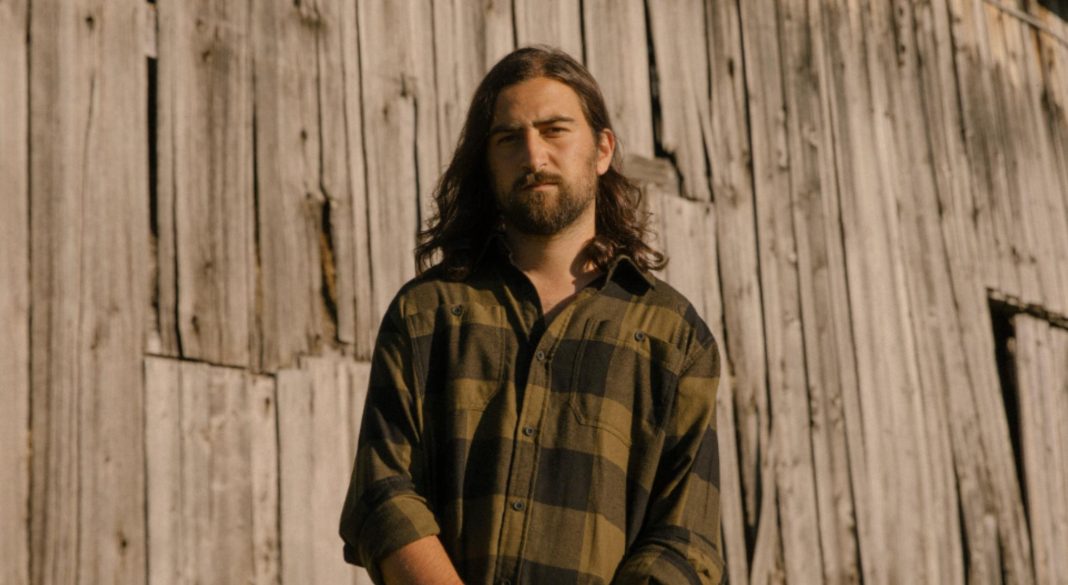When Olivia Rodrigo appeared on the BBC Live Lounge in October, there were a million and one songs she could have covered. But in the spirit of the changing weather, she opted for ‘Stick Season’, a sensitive, mid-tempo country-folk ballad that allowed her talent for story delivery to shine.
As the tale of her choice unfolded, it turns out that Rodrigo discovered the song via a gender-swapped cover by fellow songwriter Maisie Peters, which she loved so much that she thought she would track down the original artist, Noah Kahan. Olivia and Maisie aren’t alone — at time of writing, covers of ‘Stick Season’ music are raking in hundreds of thousands of their own views across the internet, and the original track is sitting pretty number two in the UK singles charts, with the possibility of becoming Christmas No 1. But who the hell is Noah Kahan, and why is your ‘for you’ page so chock-full of high-profile covers and endorsements of his work?
Kahan may be nominated for a 2024 GRAMMY for Best New Artist, but the singer-songwriter has actually been knocking around for some time. Born in Vermont in 1997, Kahan had been writing songs and uploading them to YouTube from a young age, but drew major label attention in 2017 with ‘Hurt Somebody’, a brooding track that admits to fears of loneliness, abandonment and painful self-acceptance.
Two successful records and two EPs followed, but it was the 2022 release of ‘Stick Season’ — the title track of his third album — that really cemented him as a name to watch, opting for a more trad-folk sound which he said was influenced by the straight-forward, hyper-specific lyricism of Phoebe Bridgers and Sam Fender. Indeed album highlight ‘The View Between Villages’ shares sonic DNA with Fender’s ‘Dead Boys’ or ‘Seventeen Going Under’, a potent mix of hometown affection and regional regret. “What ties this whole thing together is the shared experience of growing up with a lot of space and isolation,” Kahan said to Billboard in 2022 about his lyrical inspirations. “I want people who live in small towns to know I hear them, I see them and I know what it’s like.”
Written during the COVID-19 pandemic and referring to the time in New England when Autumn turns cold, ‘Stick Season’ had been teased on TikTok for some time before its official release, paving the way for the single’s eventual ubiquity. With couplets like “So I thought that if I piled something good on all my bad/ That I could cancel out the darkness I inherited from dad” Kahan has created a world in which generational trauma is not a guilty secret, and so fans are invited to curl up in his history as a way of better coming to terms with the pains of their own.
With over 10 million views on the YouTube lyric video alone, the ‘Stick Season’ single has been so successful that he released an extended edition of the album earlier this year, entitled Stick Season (We’ll All Be Here Forever), which featured collaborations with Lizzy McAlpine, Kacey Musgraves, Hozier and most recently, Gracie Abrams — all champions of acoustic introspection. If Kahan’s music were a Taylor Swift era, he would be ‘Folklore/Evermore’ – there is a massive crossover between the two fanbases, and in the hearts of listeners who feel that the two artists share a talent for lyrical world-building that feels like a conversation with an old friend.
“Right after ‘Stick Season’ came out last year, a fellow Swiftie actually recommended I listen to Noah,” says Bryn, a fan from South Carolina who says that she has been telling “any and everyone” about his work. “I remember feeling transported to the same place I felt I was in when listening to ‘Old Bear Mountain’. Almost like having an old, broken-in warm coat draped over my shoulders by a friend I hadn’t seen in a while on a brisk, late Fall evening.”
Pamela from Pennsylvania also cites a similar story of personal breakthrough. “I had heard Noah on the radio throughout the years but re-discovered him on TikTok one day while he was teasing the ‘Stick Season’ album and was instantly hooked. He is so earnest and genuine in all of his songs which is what drew me in — there’s something about his music that makes you feel like you’re not so alone in the world.”
Whether it was the disorientating loneliness of the pandemic or the creeping sense of existential melancholy that comes from political division and cost-of-living crisis, fans’ craving for this particular kind of intimate, confessional songwriting has only become more popular. The success of Taylor Swift, boygenius, Gracie Abrams, Big Thief, Hozier and even SZA marks an appetite for chilly songs about big feelings, a space in which listeners can wallow as the first step to feeling a little better. While the current romantic aestheticisation of these performers into ‘sad girl starter packs’ can risk artistic dehumanisation, it’s also true that the experience of listening to a musician who isn’t shy about their feelings can create huge loyalty amongst listeners, especially within minoritised fan communities where forms of relatable emotional representation feel particularly precious.
“As a general rule, I would say the ‘shes, gays and theys’ audience — one that that I am a part of — is much more willing to ‘embrace the cringe’ of being upfront about the things we love,” says Bryn. “Noah Kahan, a white guy from New Hampshire, embraces the fact that he DOES have feelings, he DOES have dark thoughts, he DOES care, and we embrace him right back. And he is a part of the wave of reminding men they are allowed to care and feel and express themselves that I hope continues to grow; there is an epidemic of male suicide ravaging the USA. I hope Noah shows us that nobody has to suffer in silence.”
Of course, as Bryn notes, emotionality isn’t exclusively the domain of young female fans. But in being smart and thoughtful about the particular music genre multiverse in which he collaborates, Kahan is particularly endearing in how readily he celebrates women artists, situating himself as something of a fangirl himself. Always quick to namecheck the women he admires and takes influence from (as well as showing attentive love to the fans who cover his music), his attitude and allyship feel refreshing as a way of further breaking down the ‘boys club’ of guitar-centred music. For young female listeners, it’s great to see him display his good taste through this sense of collaborative collegiality, demonstrating that women’s ideas, voices and contributions can be easily endorsed and integrated in non-tokenistic ways.
Amidst all the thoughtful advocacy, Kahan also seems to know how to have fun. Sweet and self-deprecating, he’s figured out how to be very good at social media, striking a balance between self-promo and down-to-earth oversharing. “I’ll reply to Noah whenever he tweets, and he’s even liked some of my jokes,” says Pamela. “It’s pretty special to me to be able to joke with the same man who makes me cry while I’m driving home from work.”
“I had the opportunity to meet Noah in Saratoga Springs after his show in September and he is genuinely one of the nicest and funniest people,” says Sunny, a fan from Canada. “He accepted everyone’s gifts with big thank yous and a smile even after hours of performing, and he was even kind enough to sign my friends’ shirt even though all we had was my eyeliner to sign it with. He connects well just by being honest — sometimes in the funniest ways like making a joke about shitting his pants because he ate too much spicy food after a big show. It keeps him accessible instead of untouchable like a lot of other celebrities.”
With a combination of talent, sincerity and playful bemusement at just how far his work is travelling, Kahan’s star power is clearly going nowhere, allowing people of all genders to find beauty in vulnerability and collaboration. Alongside the GRAMMY Nomination, there’s the small matter of a swiftly-selling UK Arena tour, and, if his teasing posts are anything to go by, even more collaborations with folk-pop’s best and brightest, only further cementing his sincere, open-hearted appeal.
“We’ve all been through a lot, especially within these last few years, and I truly believe his music has helped me process and find peace in a lot of ways, which we all deserve,” says Pamela. “Every word, every song, every speech – he’s so genuine in everything he does. If there’s one up-and-coming artist who deserves the world, it’s Noah Kahan.”







